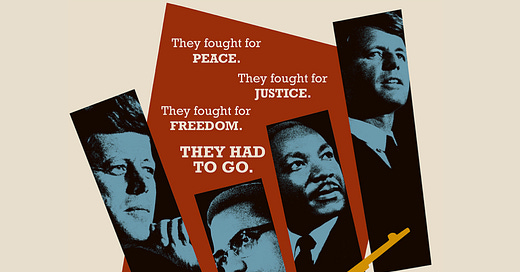Episode 1 of John Kirby’s Four Died Trying will be released on Apple TV in a few weeks, but I was given an advanced copy and it did not disappoint. It gives us a glimpse into the post-World War II propaganda machine and the dramatic effect it had on the political mood in the U.S., which JFK ultimately inherited when he became president.
For those who may have missed last week’s Prologue, and our review of it, Four Died Trying is a docu-series airing on Apple TV, and available for rent on YouTube and Google Play Movies. It was Executive Produced by Mark Gorton, co-chair of the American Values 2024 super PAC, which created and funds The Kennedy Beacon.
The aim of the series is to provide a fresh review of the events, personal ideologies, and conspiracies that eventually led to the deaths of four of the most influential, and controversial, men in United States history: John F. Kennedy, Martin Luther King Jr., Malcolm X, and Robert F. Kennedy.
For those who appreciate a well-produced, eye-catching, fast-paced docu-series, aesthetically, like the prologue, the first episode provides all of those elements in abundance. From the complimentary music selection to the cutaways of black and white footage showing heated, “Red Scare” testimonies, episode one does a phenomenal job of keeping the viewer’s attention; even if the viewer may not traditionally be all that interested in political films or the documentation of historic events.
Likewise, for those who love to learn about the nuanced and complex history of the United States or if you’re the type of person who takes an interest in trying to understand how “we got here” by studying “where we’ve been” this episode, and this series, is especially for you.
In this review, I will do a brief rundown of some of the most impactful elements of the first chapter of this series. We’ll also observe how many of the events discussed in the episode still impact society 50 to 60 years later.
Out the gate, Robert F. Kennedy Jr’s interview brings up what many consider as one of, if not the most important speeches given by a president or politician in American history — Dwight Eisenhower’s farewell address to the nation. Most times, when Eisenhower’s historic speech is referenced, people immediately think of his famous line, “In the councils of government, we must guard against the acquisition of unwarranted influence, whether sought or unsought, by the military-industrial complex. The potential for the disastrous rise of misplaced power exists and will persist.” But this episode recalls two parts of Eisenhower’s farewell speech not often mentioned.
Eisenhower does issue an ominous warning about the military-industrial complex. But in that warning, he also explains that before the conflicts that had taken place right before and during his term in office, the United States didn’t have an industry solely dedicated to making instruments of war. Before, manufacturing companies would make weapons as needed, which usually meant at times when the U.S. was involved in a major war. However, at the time of Eisenhower’s address, the U.S. was in a state of perpetual warfare and conflict, whether or not there was an official declaration by Congress as the Constitution requires. For this reason, Eisenhower stated that the U.S. could no longer rely on “improvisation” to prepare for war. Therefore, a permanent arms industry was created.
Eisenhower said that at the time the U.S. spent more on national defense than the net income of all U.S. corporations combined. I’d like to provide you solace by telling you that that jarring statistic provided by Eisenhower no longer plays a significant role in U.S. policy today. But the unfortunate reality is the former president’s mention of this fact gives us a better understanding of how politicians and corporations have been incentivized for decades to keep us in an indefinite state of war, an outcome Eisenhower prophetically foreshadowed.
In 2022 alone, the defense industry made roughly $952 billion. You read that right. Not millions. Billions. For the fiscal year of 2023, the total U.S. defense budget was $1.52 trillion. For context, the largest spender in the fiscal year of 2023 so far is China which spent a total of $292 billion. Beyond that, the defense industry spent over $100 million on lobbying politicians. So if you’re wondering why the U.S. is fighting in or providing military aid in one form or another in countries like Ukraine, Iraq, Somalia, Syria, Gaza/Israel, Sudan, Kenya, etc., the answer is the same in 2023 as it was in 1961 during Eisenhower’s farewell address. War is a trillion-dollar industry. Other companies and industries may fail or experience economic hardship, but as long as the U.S. can keep finding new military conflicts to involve itself in, the defense industry will always be the most profitable in the world. And it’s been made clear that any person, or president, who stands in the way of that profit will suffer grave consequences. We know that both JFK and RFK were likely two of the first high-profile elected officials to have suffered those consequences.

Another seldom discussed point made in Eisenhower’s speech is the warning of the potential dangers of what he called the “scientific technocracy.” In an era where Silicon Valley and the federal government are seemingly inseparable, the consequences of the technocracy are felt now more than ever before.
Few people are aware of the CIA’s venture capitalist firm In-Q-Tel. The firm is based in Arlington, Virginia. Not only is In-Q-Tel responsible, directly or indirectly, for the creation of most of the largest tech companies in Silicon Valley, but they effectively have a blank check to use federal funds to financially influence or manipulate any company the federal government may find useful for its sinister motives. If that isn’t disturbing enough, the firm also has no legal obligation to reveal what companies it chooses to invest in, unlike other venture capitalist firms, thanks to policies passed by Congress, making it extremely difficult to know which companies are being influenced by the intelligence community.
The wealthiest man in the world, Elon Musk, owns the largest (and most subsidized) electric car company and the most popular social media platform in the world. The former would never have been profitable without significant help from federal and state governments. But the bill comes due. And when the government contributes to your success, it expects those favors to be reciprocated, sooner or later. So when Musk started Space X, the Pentagon came knocking, eventually contracting the company to create weapons systems for the DoD. Musk took those contracts despite originally claiming the purpose of the company was to send civilians to space, never mentioning any intentions of working with the Pentagon. But did he really have a choice? Probably not.
There are an infinite number of examples of the negative impact the technocracy has had not only on American society but on countries all over the world. So, as a person who’s done extensive research into the unholy union of tech companies, the intelligence community, and the financial web that joins the two together, I really appreciated the documentary pointing out a salient but rarely acknowledged warning in Eisenhower’s speech.
The rise of McCarthyism, or the “Red Scare,” is another topic thoroughly explored in Four Died Trying, Episode 1. Truthfully, given the last few years, the way the documentary describes McCarthyism makes the 60’s and 70’s feel much more familiar to me than they should, considering I wasn’t born yet.
The film series revisits how everyone and anyone was demonized if their neighbors, employer, or even their own family members thought they were a communist or Russia sympathizer. One interviewee points out that people were not scared of the ideology of communism itself, but rather terrified of being accused of being a communist. People were required to sign a “loyalty oath” when applying to a job. Artists made anti-communist songs. Hollywood even began heavily pushing Red Scare propaganda because it became good for business. Of course, the fear of communism was used to control the population. Hoover encouraged friends and family to spy on each other. The intelligence community used allegations of communism to spy on whoever they wanted to. They even used the Red Scare to undermine the civil rights movement. If you were seen associating with civil rights leaders or advocating for civil rights causes, you could easily be called a communist and be subject to all the consequences that follow such accusations.
The reason this history might feel as familiar to you as it does to me is likely because, post-2016 elections, we’ve seen similar tactics used against anyone of notoriety who challenges the accepted narrative of the Military-Industrial Complex (MIC) and the powers that be. When Hillary Clinton lost in 2016, she immediately accused Trump of benefiting from election rigging ordered by Vladimir Putin himself. And the liberal mainstream media uncritically parroted these allegations. If someone ever scrutinized the intentions or facts of those claims, they were labeled a “Putin puppet” or a “Russian bot.” Many people lost their jobs, received threats, or were politically blacklisted for refusing to blindly accept the allegations made against Russia. Allegations that seemingly were only pushed onto the public to serve the agenda of the powers that be. And just like in the 50s and 60s, Hollywood celebrities once again joined in pushing the Russia-phobic tropes to protect their careers.
Four Died Trying reminds us that many McCarthy-era tactics are still being used today. And, unfortunately, just as many fell victim to propaganda back then, we still see far too many falling for the same propaganda today.
Four Died Trying isn’t even two episodes in, but it has already done a great job exposing the propaganda and powerful foes that historic change makers like JFK, RFK, Malcolm X, and MLK had standing in the way of the changes those gentlemen were seeking. It also gives the viewers some idea of just how much effort the elites put into creating an intricate system of corruption and the extensive lengths those elites were willing to go to in order to protect that system. I’m anxiously waiting to see what next week’s episode has in store!









Great review can't wait to see the series & thrilled Niko is a featured voice beyond Jimmy Dore! <3
This proper review of the corruption and destruction of our rule of law needs wide distribution.
"All those who enter here abandon all hope."
https://www.armstrongeconomics.com/international-news/rule-of-law/why-our-legal-system-is-collapsing/